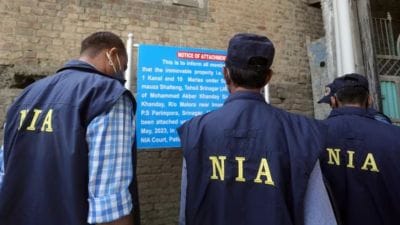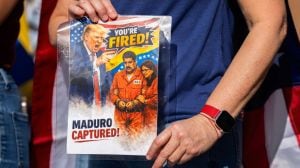Kargil to Sierra Leone
Every day Major Ananthanarayan Arun pulls out a letter pad from under a sheaf of papers and lovingly writes home. He can barely jot down a...

Every day Major Ananthanarayan Arun pulls out a letter pad from under a sheaf of papers and lovingly writes home. He can barely jot down a few sentences before the impressive array of phones on his table begin to ring almost simultaneously. On line one is New York, on line two India. The wireless set crackles constantly.
Indian battalion in Rogberi on one set, Nigerian battalion on their way there, on another. On the internal line, he is asked for the papers from special representative to secretary general Oluyemi Adeniji8217;s office and, on the other, letters from the force commander Major General Vijay Jetley8217;s office.
Unruffled he keeps the letter pad aside and finishes the fire fighting. And during the lull before the next storm breaks out, he adds a few more lines to the letter to his daughter. It is a different matter that his daughter, Zephyr, back home in Hyderabad is only a year plus and will get to read the letters only when she is an adolescent if not an adult. Major Tom of the British army walks into the room and shows Arun photographs of his children and the two men are lost in their own personal worlds.
Leaving the two alone, I drove down to Hastings to meet my friends in 18 Grenadiers. Even on their United Nations cap they have the emblem of the Tiger Hill Paltan emblazoned. The conquerors of Tiger Hill. Soon after their arrival they lived up to their reputation by speedily deploying at Rogberi along with Mechanised Infantry and saving it from the Revolutionary United Front RUF rebels.
But Major Arun8217;s fellow Hyderabadi and my friend, Captain Joy Dasgupta, is still looking for a bride. Last year when Joy returned home to get engaged after capturing a hill feature during the Kargil war, the girl he was supposed to get engaged to backed out saying she did not want to get married to a coffin. This year before he could get engaged to someone else, he was packed off to Sierra Leone.
Sitting in makeshift barracks amid thick foliage, warding off mosquitoes almost as large as sparrows and more deadly than vultures, Dasgupta grumbles as he scratches at hundreds of insect bite sores,8220;Kab shaadi hogi, kaun janta hai who knows when will I ever get married?8221; His fellow officers enjoy a good laugh. Most of the Tiger Hill officers are here 8212; Colonel Khushal Thakur, Lt Col Panaghal, Major Rajiv Kumar, gallant young Sachin Nimbalkar. It was great meeting them so far out here in Hastings.
Back at the little tented camp of the mechanised infantry in Freetown, I join a small celebration. The soldiers along with Grenadiers are just back from Rogberi, earning laurels for the Indian army and the much criticised United Nations Mission in Sierra Leone UNAMSIL. Captain Rohit Dev, the youngest officer in the battalion, is celebrating wife Aparna8217;s birthday. She, of course, is in India. Her birthday happens to coincide with that of another officer, Major Suryabhanu Rai.
The officers raise a toast with mango juice since none of them drink to the safe release of the 21 Indian soldiers in Pendembu and 233 in Kailahun and cut the cake, small enough to be finished in just one bite. 8220;But that is the largest available in Freetown,8221; Dev protests when asked about the size of the cake.
Life for the Indian contingent is tough but as usual nobody is cribbing. They have not received mail for over 45 days now. They have not received their salaries at all ever since they came and getting through to India on the phone is like getting the pot of gold at the end of the rainbow. Yet at the Kabasa lodge where the President of Sierra Leone used to live, Major Ajay Pasbola and Captain Navneet Jaryal smile to raise the morale of their troops.
I sit with them and listen to their tales, sharing their experiences from the heights of Kargil to life in a distant west African nation, once again amazed at the adaptability of our soldiers.
- 016 hours ago
- 027 hours ago
- 037 hours ago
- 0415 hours ago
- 058 hours ago































